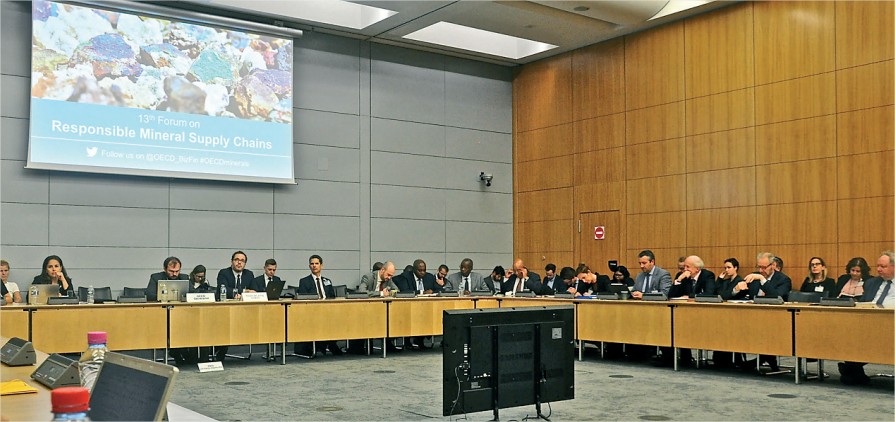Senior officials of the World Diamond Council (WDC) provided an overview of the organisation’s revised System of Warranties (SoW), during two sessions on April 24th at the 13th Forum on Responsible Mineral Supply Chains of the Organisation for Economic Cooperation and Development (OECD) in Paris.
During the briefings, WDC president Stephane Fischler described the revised SoW as an “essential building block” for participants in the diamond supply chain towards implementing the OECD’s due diligence guidance for minerals from high-risk areas.
The first of the sessions was an early-morning side event organised together with the Responsible Jewellery Council (RJC), at which the WDC presented its revised SoW and RJC explained its new Code of Practices (see box). The second was a deep-dive session that was part of the OECD forum’s main agenda. Titled “Putting Commitments into Action”, it focused on recent standardmaking developments in upstream and downstream diamond supply chains.
The deep-dive session was moderated by Terah de Jong, a technical advisor at the USAID Artisanal Mining and Property Rights Project.
The WDC’s revised SoW was approved by the organisation’s board of directors in October 2018. Like the earlier version of the SoW, it requires all participants in the diamond and jewellery value chain, from mining companies to jewellery retailers, to issue warranty statements on their businessto-business (B2B) invoices and memos, testifying that the diamonds being sold originated from sources in compliance with the Kimberley Process Certification Scheme (KPCS). But the statement now also verifies that the participants adhere to the revised SoW, which requires that they conduct a self-assessment to ascertain whether they comply with universally accepted principles on human and labour rights, antimoney laundering (AML) and anticorruption.
The revised SoW Guidelines specifically reference the UN Guiding Principles on Business and Human Rights, the International Labor Organisation (ILO) Declaration on Fundamental Principles and Rights at Work, the UN Convention Against Corruption, and also national Anti-Money Laundering (AML) Guidelines that comply with the Financial Action Task Force (FATF) 40 Recommendations on Money Laundering for Dealers in Precious Metals and Stones.
Fischler said, “The revised SoW has to be seen within the context of a range of responsible supply chain opportunities being offered to a very diverse industry. The ultimate objective for all of us is the same – ensuring consumer confidence in the products we sell. The different systems need to be complementary, being building blocks on the road to full compliance.”
Peter Karakchiev, the CIBJO Board member who chaired the side event on April 24th, explained, “The revised SoW is designed to support the KPCS, covering not only the trade in rough diamonds, but polished diamonds as well, and also trading between every participant in the diamond and jewellery value chain, and not only trade between participants in different countries. We are hoping that the KPCS will be expanded to include provisions related to human rights, labour rights, anticorruption and AML, but we are not waiting for it to happen, and have already incorporated those elements in our own system.”
Fischler and Karakchiev both explained that diamond companies are not permitted to pick and choose what elements to implement. “Members of the trade who implement the SoW are required to fulfil all of its elements depending on their size and sector, as they are outlined in the Guidelines,” Karakchiev said. “The self-assessment toolkit that is being developed will help them do that.”
It should be noted that implementation of the SoW is already required by a range of industry bodies, including RJC, the World Federation of Diamond Bourses (WFDB), De Beers’ Best Practice Principles and CIBJO’s new Responsible Sourcing Blue Book.
To assist in the implementation of the new SoW, the WDC is creating a toolkit based on selfassessment questionnaires, which will assist members of the industry in properly evaluating how they are complying with the process. It will take into consideration the stage or stages of the diamond and jewellery value chain in which the member is involved, the size of the member’s business, and whether the member is already compliant with other due diligence systems, like that of the Responsible Jewellery Council.

